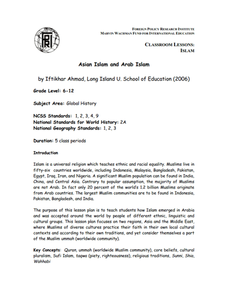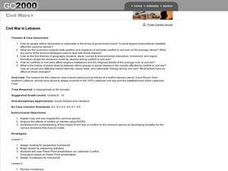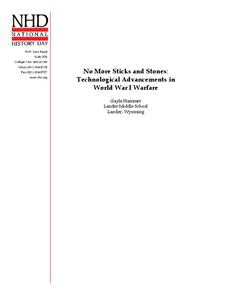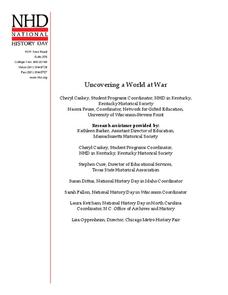Curated OER
Civil War Photographs: What Do You See?
A study of an image from The Library of Congress collection Civil War Photographs 1861-1865 launches an investigation of the connection between the Civil War and American industrialization. After analyzing “Petersburg, Va. The...
Curated OER
Hiibel vs. Sixth Judicial District Court of Nevada
Did Hiibel's arrest and conviction for not telling a police officer his name violate his rights? Have your learners read a short description of the case and answer the comprehension questions that follow. Resource links and extension...
Curated OER
Ethos, Logos, and Pathos in Civil Rights Movement Speeches
Examine three speeches while teaching Aristotle's appeals. Over the course of three days, class members fill out a graphic organizer about ethos, pathos, and logos, complete an anticipatory guide, read speeches by Martin Luther King Jr.,...
Foreign Policy Research Institute
Asian Islam and Arab Islam
Focus on the impact and practice of Islam throughout Asia and the Middle East. Learners review the seven major religions, the spread of Islam, and Islamic tenets commonly practiced. They then research one country that practices Islamic...
Center for Civic Education
The Equal Rights Amendment in the 1970s and Today
Discover the fascinating history of the Equal Rights Amendment and discuss the major implications and considerations associated with it today. Here you will find background information on the topic, a graphic organizer summarizing...
Albert Shanker Institute
Economic Causes of the March on Washington
Money can't buy happiness, but it can put food on the table and pay the bills. The first of a five-activity unit teaches pupils about the unemployment rate in 1963 and its relationship with the March on Washington. They learn how to...
Curated OER
Writing an Analytical Essay From a Supreme Court Case
Critical thinkers read a summary of a United States Supreme Court case, including important background information and the court's final decision. They form an opinion in agreement or disagreement regarding the case and then write an...
Smithsonian Institution
Art to Zoo: Life in the Promised Land: African-American Migrants in Northern Cities, 1916-1940
This is a fantastic resource designed for learners to envision what it was like for the three million African-Americans who migrated to urban industrial centers of the northern United States between 1910 and 1940. After reading a...
National Research Center for Career and Technical Education
Business Management and Administration: Compound Interest - A Millionaire's Best Friend
Many math concepts are covered through this resource: percentages, decimals, ratios, exponential functions, graphing, rounding, order of operations, estimation, and solving equations. Colorful worksheets and a link to a Google search for...
Historical Thinking Matters
Rosa Parks: 5 Day Lesson
What led to the success of the Montgomery Bus Boycott, and how might historians approach this question differently? This rich series of lessons includes a short introductory video clip, analysis of six primary source documents, and...
PBS
Voting Rights History
New ReviewWhy is voting so important, anyway? Learn more about the importance of exercising a right for which many men and women marched, fought, and legislated with an interactive timeline activity.
PBS
Evolution of the Presidency: Theodore Roosevelt to Franklin D. Roosevelt
How much power should a president be allowed to exert? Theodore Roosevelt and Franklin D. Roosevelt exercised their power according to their interpretations of the United States Constitution, and these interpretations affected the...
Daughters of the American Revolution
Lesson 1: How Do Society’s Expectations Influence Education?
The history of women's education can be traced back to the delicate stitching of student samplers from the 19th century. Modern-day pupils examine and analyze four primary sources, three of which are images of embroidered samplers, which...
Curated OER
Civil War Medicine
Eighth graders discover details about medical care during the American Civil War. In this medical advancements lesson, 8th graders participate in classroom station activities that require them to study doctors, amputation, medical...
City University of New York
Jim Crow and the Fight for Civil Rights
The history of voting rights in America has always been rocky, especially in the time period after the Civil War. Learn about the ways that Jim Crow laws affected the voting rights of African Americans with a lesson featuring primary...
Idaho State Department of Education
Lessons for Social Studies Educators
Point of view, purpose, and tone: three concepts readers of primary and secondary source materials must take into account when examining documents. Class members view a PowerPoint presentation and use the SOAPS strategy to identify an...
Curated OER
Research Project on the Impact of Civil War and Conflict on the Common Person
Students create character using their knowledge from one of the civil war case countries. They create resume and cover letter for character to apply to a UN agency, and conduct research to create presentation that matches the character...
Curated OER
Civil War in Lebanon
Students explain how civil war impacts the common person. They analyze the effects of conflict on identity. They synthesize the impact of the civil war on the common person. They view a PowerPoint on Lebanese Conflict.
Curated OER
The Impact of Civil War and Conflict on Identity
Students view and discuss Powerpoint presentation on Colombian Conflict, examine how civil war impacts the common person, review vocabulary, and complete critical thinking questions with classmates.
Curated OER
How Does My Government Grow?
Students identify the core democratic values. They explain how the values affect their life in America. They also relate the topic of philantrophy to the core values.
Public Media for Northern California
An Educator’s Guide to Teaching Gun Control Issues | The Lowdown
The topic of gun control is vast, controversial, and difficult to introduce to students. This gem of a resource covers both sides of the issue and provides topic background, various multimedia and print resources, analysis questions, and...
National History Day
No More Sticks and Stones: Technological Advancements in World War I Warfare
Remind young historians that many technological advancements influenced the events of World War I. After analyzing technology's evolution through primary sources, discussing the changes over time, and watching various video clips,...
National History Day
“War Is Hell. We Know it Now.” American Soldiers in the Meuse-Argonne Offensive
Understanding the soldier's experiences during World War I sometimes takes a newscast. Learners see the importance of understanding multiple points of view with a newscast project surrounding the Meuse-Argonne Offensive. Compare and...
National History Day
Uncovering a World at War
Has media always had an influence on public policy? After researching and reading news articles written during World War I, learners understand the influence of communication and media. They discuss articles in small groups and as a...
Other popular searches
- Common Core Language Arts
- Common Core Math
- Common Core Reading
- Common Core Standards
- Common Core Social Studies
- Common Core Writing
- Common Core Math Lessons
- Science Common Core
- Common Core English
- Common Core Ela
- Common Core Lessons

























